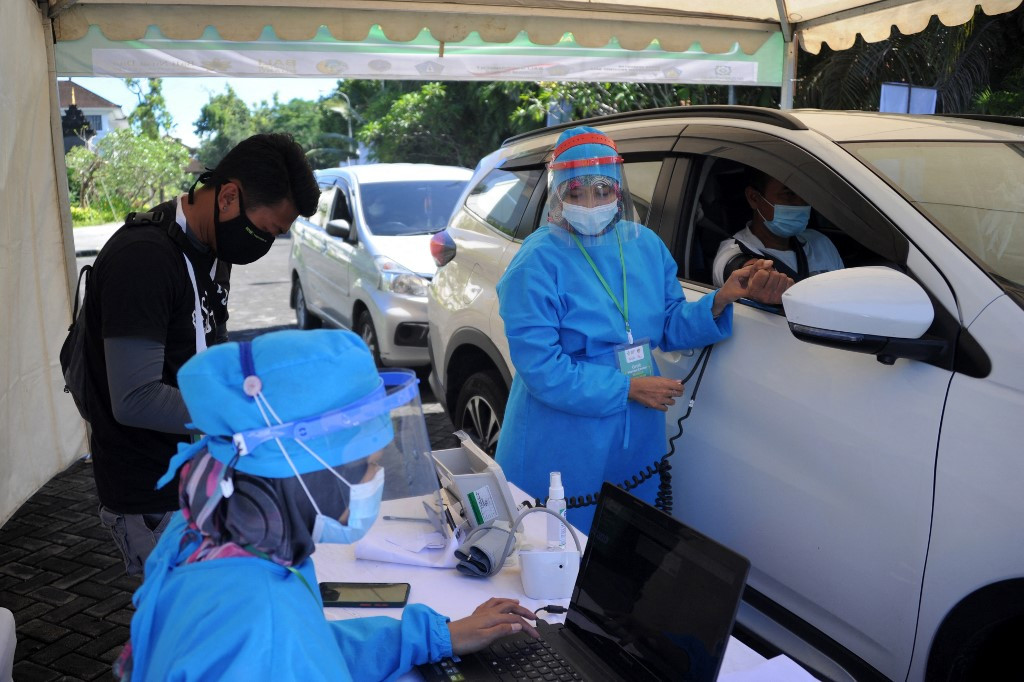Popular Reads
Top Results
Can't find what you're looking for?
View all search resultsPopular Reads
Top Results
Can't find what you're looking for?
View all search results[INSIGHT] Overcoming COVID-19 vaccine hesitancy
Aiming for vaccination coverage of 181 million Indonesian citizens will be challenging if people have little confidence in the vaccine, a phenomenon known as vaccine hesitancy.
Change text size
Gift Premium Articles
to Anyone
I
t is a significant achievement that Indonesia initiated its vaccine rollout on Jan. 13, with President Joko “Jokowi” Widodo receiving the country’s first COVID-19 jab. Jokowi sent a firm message to the people that all those who are eligible and offered the vaccine should take it.
Nevertheless, aiming for vaccination coverage of 181 million citizens will be challenging if people have little confidence in the vaccine, a phenomenon known as vaccine hesitancy. Strong demand for and acceptance of COVID-19 vaccines will be crucial but promoting acceptance and buy-in are no easy tasks.
Several studies have warned us about the prevalence of vaccine hesitancy among Indonesians. A survey by Saiful Mujani Research & Consulting (SMRC) in mid-December 2020 showed a large number of Indonesians were hesitant about obtaining a COVID-19 vaccine amid rampant concerns about safety and the efficacy of the new coronavirus vaccines.
The nationwide survey found that only 37 percent of respondents were willing to be inoculated. It is also alarming that 40 percent of respondents remained undecided about whether to get vaccine injections, while the remaining 17 percent mentioned their disapproval of the vaccination initiative.
Of course, vaccine hesitancy is not a uniquely Indonesian, but a global, phenomenon. It is noteworthy that the World Health Organization listed vaccine hesitancy among the 10 threats to global health in 2019.
There are various and complex reasons related to COVID-19 vaccine hesitancy. For example, given the unprecedented speed at which COVID-19 vaccines have been developed, some people worry about the safety and efficacy of the vaccines. Another key factor is distrust in the government, medical research community and pharmaceutical companies.
Furthermore, some people do not believe COVID-19 is a serious threat to their health or question the religious legitimacy of the vaccine although the Indonesian Ulema Council (MUI) has declared that the CoronaVac vaccine administered in the country is halal. Some others may think they do not need a vaccine, because they have been infected.
These hesitant individuals may be seeking or waiting for more information about vaccine trial outcomes regarding safety and efficacy or the vaccine approval process. They may also still observe how people around them behave. If these concerns are not well addressed, this “wait and see” cohort could potentially hinder the achievement of the required vaccination coverage.
Additionally, we should take into consideration the large volume of hoaxes widely spread by antivaxxers. Several studies exploring views of COVID-19 vaccination on various social media showed sharp increases in antivaccination clusters and their engagement with “wait and see” individuals. These studies demonstrated that members of the antivaccination movement are intensively mobilizing to discourage and prevent people from getting the COVID-19 vaccine.
Some antivaxxers have resisted other COVID-19 key preventative measures, for example, stay-at-home orders, mask wearing and contact tracing.
So, how can we overcome this COVID-19 vaccine hesitancy?
Due to the complexity of vaccine hesitancy, instead of applying a “one-size-fit-all” strategy to solve vaccine hesitancy, nuanced approaches are preferable to address existing health inequities and to ensure that those who are hesitant do not turn into outright vaccine rejectionists. Strategies should also be carefully tailored according to the target population, their reasons for hesitancy and their specific context.
Despite the above complexity, there are several basic principles and approaches that are promising to assist us in combating COVID-19 hesitancy. Firstly, utilizing the well-known fact that humans are very socially motivated and usually try to obtain social approval or fit in, and individuals commonly take their behavioral cues from people in their social network.
We can take advantage of these inclinations by strengthening health promotion by healthcare providers, government agencies, the media and community and religious leaders to enhance people’s awareness and motivation to get vaccinated. The more people who are aware and willing to participate in vaccination the greater opportunity for the normalization of vaccination and vaccination becoming part of social norms.
Second, strengthening strategies categorized as behavior-focused, including providing incentives, sanctions and requirements such as vaccinations as pre-requisites for school admission. The shared aim of these strategies is to shift the framing of vaccination into a routine or expected behavior or practice, and thus vaccination is seen as a common or accepted norm.
To further strengthen these strategies, the vaccination procedure should prioritize the practicalities of availability, accessibility, affordability, convenience, service quality and incentives.
Third, we should facilitate the intensive engagement of community leaders, community mobilization tactics, mass media campaigns, the use of reminder and follow-up systems, training of healthcare providers, including in primary health care, to shape positive views toward COVID-19 vaccines.
These strategies should be combined with the availability of nonfinancial incentives, vaccine mandates as well as efforts to make vaccination more convenient.
Finally, studies recommend that programs to minimize vaccine hesitancy and promote vaccines should employ the basic principle of a “people-centered approach” that strongly emphasizes the importance of community-informed participation in preparing for mass COVID-19 vaccination. In this context, dialogue-based interventions that consist of social marketing, intensive engagement with community leaders (including religious and youth leaders) and trusted community representatives are essential.
These concerted efforts are potentially effective in improving trust, as well as ensuring adequate buy-in so that those most hesitant about being vaccinated or those most vulnerable to the severe impacts of COVID-19 are well targeted.
***
A senior lecturer and researcher at the Faculty of Public Health, Hasanuddin University










